Biden to Ban Menthol Cigarettes

After years of pleas from health advocates, particularly in the Black community, President Biden appears poised to issue a ban on menthol-flavored tobacco products.
WaPo‘s Laurie McGinley (“Biden administration expected to announce plan to ban menthol cigarettes“) reports:
The Biden administration is expected to announce this week that it will propose a ban on menthol cigarettes, an action urgently sought by tobacco opponents and civil rights groups that say African Americans have been disproportionately hurt by the industry’s aggressive targeting of Black communities.
The administration also is poised to say it will seek to ban menthol and other flavors in mass-produced cigars, including small cigars popular with young people, according to administration officials familiar with the situation who spoke on the condition of anonymity because they are not authorized to discuss it publicly.
It could be years before such bans would take effect, but the administration’s announcement is likely to be hailed by antismoking organizations as a critical and long-overdue step in curbing tobacco use and improving public health. Despite sharp declines in smoking in recent years, tobacco use remains a leading source of illness and death in the United States and worldwide, especially among people of color.
Civil rights organizations and health groups press Biden for a menthol cigarette ban
Antismoking groups have been frustrated for years by Washington’s inaction on menthol cigarettes and have turned to states and localities to request bans, with mixed success. They became more optimistic about a possible federal ban in recent months amid President Biden’s repeated vows to reduce health disparities made glaringly obvious by the coronavirus pandemic, and efforts by the Black Lives Matter movement to focus on institutionalized racism.
The Food and Drug Administration faces a court deadline Thursday to respond to a 2013 citizen petition seeking a menthol-cigarette ban. The suit was filed by public health groups last year to compel the FDA to respond to the petition. It is pending in federal district court in Northern California.
“There is not an open question on whether menthol in cigarettes is harmful — the evidence is overwhelming and consistent,” Joelle Lester, director of commercial tobacco control programs at the Public Health Law Center at Mitchell Hamline School of Law in Minnesota, said in a recent interview. The law center led a group of 19 public health organizations to file the 2013 petition.
“The Biden administration doesn’t know how to solve every problem. But they know what to do here, and they can do it,” Lester said.
My reflexive position on matters such as these is that education, not regulation, is the right path. Not only is it paternalistic for the government to ban a particular variant of a product—especially one favored predominantly by a historically marginalized group—but the legal basis for doing so is at best dubious.
Yes, Congress had delegated its authority in this area—as it has in so many areas—to Executive branch regulatory agencies. So long as the administration follows the protocols of the Administrative Procedures Act, including prepublication in the Federal Register, they likely have the power to do this. But the basis for doing so, that menthol makes the product slightly more addictive, seems a stretch.
Still, the notion that this variety is particularly popular in the Black community is well-established. Indeed, in my Army days in the late eighties and early nineties, it was the subject of much joking among the Black soldiers I knew. Newports, in particular, were considered a “Black” cigarette.
It was no accident: the marketing by the tobacco companies heavily pitched the product to Black consumers.
This may simply be a case where the crisis outweighs the comparatively marginal impact on individual choice.
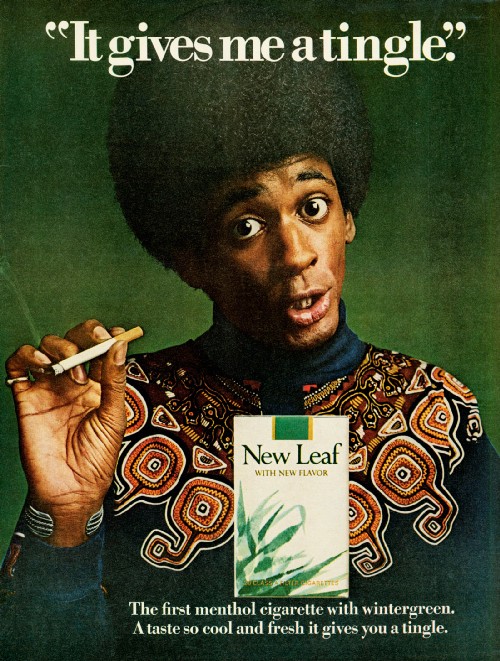
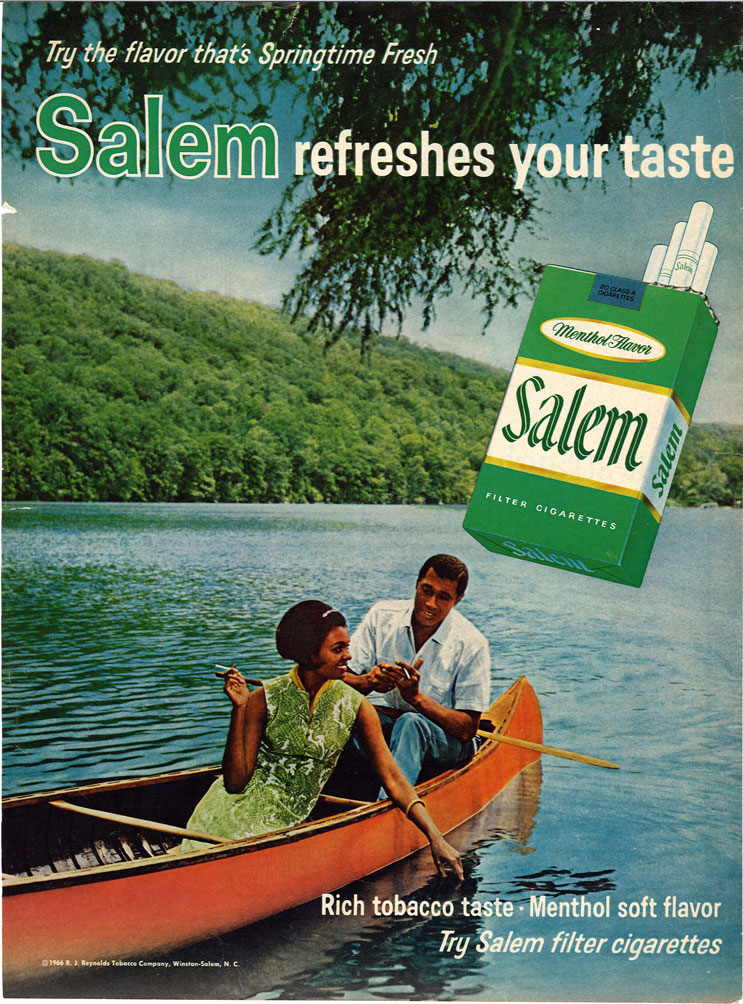
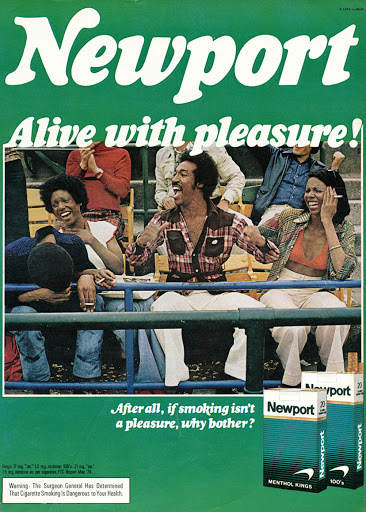
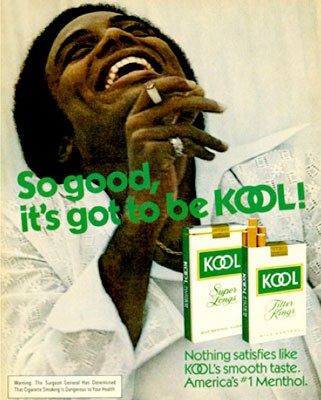

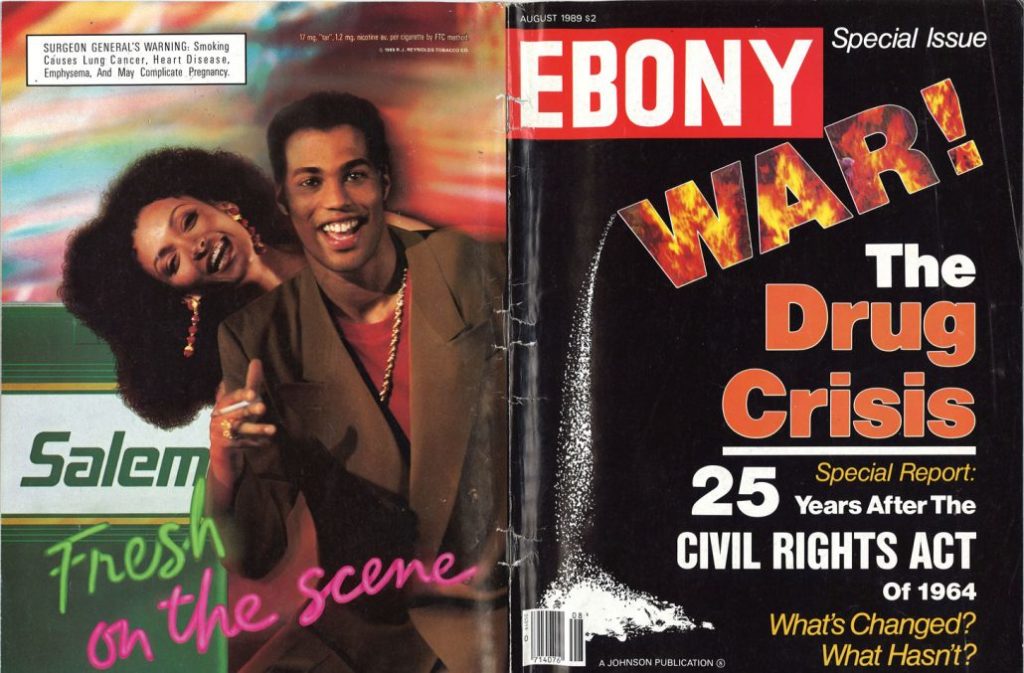

Quibble: banning mass manufacturing of X is not the same as banning X. People will still be free to make flavored cigarettes for themselves, they just won’t have large companies pushing them to entice people into starting a negative habit.
When I was driving the Sleepytown Yellow Cab (’70-’73) I was choking on the butts all night long with whatever mud I could I could get. Many nights before Denny’s (used to be open 24 Hours) came to town the swill cost a quarter from the coffee machine at the Illinois Central Passenger Depot.
One night I picked up a sister and the first thing she did was ask me for a cigarette.
I handed her the pack and said: “Help yourself.”
“What!” she said. “I didn’t know any white people smoked Kools!”
I just laughed.
Salem don’t smoke ’em…
@Mister Bluster:
In high school (99.999% white), a number of people smoked menthols–specifically so people wouldn’t bum them. 🙂
On the topic of “marketed towards blacks”…. I remember the ads in up north for Newports and Kools as featuring white people.
@Mu Yixiao:
I seem to vaguely remember them targeting women.
@Michael Cain:
Same here. Lots of long 80’s hair. And capris pants. And bikinis.
Progressives: “Ban tobacco because legal marketing of it disproportionately harms people of color.”
Also Progressives: “Legalize marijuana because banning it disproportionately harms people of color.”
Sigh.
HTF are swanky young brothas supposed to identify the white womenz that are down with personal reparations now?!?!?!
Thanks Biden
@Michael Cain:
My grandmother smoked Now Menthols. She was white. I was an adult when I learned that menthols are way more popular with Black people than whites.
@R. Dave:
Marijuana is far less harmful than tobacco — especially since it’s also available in edible form — and it’s not physically addictive. There’s no physical “withdrawal” from pot. Psychological, maybe, but not physical. Nicotine users who quit cold turkey go through physical withdrawal symptoms. A heavy pot smoker just gets annoyed.
I’ve never smoked tobacco in my life. I tried it; I thought it tasted disgusting.
I stopped drinking wine on New Year’s Day because I was on my way to developing a serious problem with it.
Now, I smoke weed, and that’s it.
@R. Dave:
Both can be true
I used to smoke menthol, when I used to smoke.
Started with them in my twenties by getting them from a vending machine one night when I was rather the woe for wear. Woke up Sunday morning, looking for a smoke and … eh? What?
No other smokes to be had, so…
Actually liked them, smoked them ever after.
Amusing thing was when sometimes back in the days of my mis-spent youth I might skin up a joint using a menthol for part of the makings.
Cue various reactions on the part of fellow tokers:
“A minty spliff? WTF!”
“Don’t like it, pass it back, my friend.”
🙂
@R. Dave: what Doug said. You haven’t illustrated a contradiction.
@Nightcrawler: I smoke cigarettes, and have quit, and gone back, and quit later, so I know it’s physically addictive, but I read recently that tobacco executives came up with the idea of telling people that it was the hardest drug in the world to quit so that people would give up trying. It was a form of marketing. Isn’t that sinister?
Hmm, the argument on banning flavors in vaping was to leave the menthol flavor to facilitate cigarette smokers moving to the far safer vaping. Now, they move to the next element of their plan.
But maybe banning menthol in cigarettes will facilitate transition to the safer vaping of menthol and nicotine. Or maybe the vapes are just more profitable for the tobacco companies while a lot of cigarette revenue goes to the Tobacco Settlement used by the feds and states.
Sure, in theory one can make a logically consistent argument that there are costs and benefits to both legalization and prohibition of any substance, and the net result of weighing those costs and benefits comes out in favor of legalizing marijuana but banning tobacco. But, does anyone here honestly believe progressives’ views on these issues are primarily driven by that kind of dispassionate cost/benefit analysis?
When the next Eric Garner situation arises because cops are tasked with enforcing the ban on menthol cigarettes, will the progressives who championed that ban view it as one of the unfortunate but inevitable costs that they factored into their position, or will they dodge any sense of responsibility for it and just criticize the cops for their heavy-handed and racist tactics? When the legalized marijuana industry inevitably becomes dominated by large corporations with slick, morally questionable marketing campaigns disproportionately aimed at the same marginalized communities that the tobacco industry targeted, will progressives defend that situation as preferable to the alternative of prohibition, or will they just follow more or less the same anti-corporate script they do with other industries now?
To ask these questions is to answer them. So, to illustrate what I see as the contradiction, here’s the unspoken third step in my initial comment:
@R. Dave: “To ask these questions is, of course, to answer them.”
Maybe if one happens to be hanging around a college dorm at midnight. Or trying to demonstrate the meaning of sophistry.
The difference between the “bans” on marijuana and menthol cigarettes is that the former is enforced with lengthy prison sentences while the other presumably will not be. So there is indeed a social justice — no scare quotes, thank you — element to legalizing weed: We will no longer incarcerate people, primarily minority people, for using and selling a substance that is almost universally popular throughout the country. While I strong suspect no one, white or black, will get ten years in Leavenworth for lighting up a Kool.
As for the Eric Garners of the new world, I will agree with you entirely as soon as any state legislature pronounces selling or using menthol cigarettes a capital crime of such import that local police are allowed to murder anyone they suspect involved in the deed. Other than that, liberals will not be at all to blame for the heavy handed tactics of police who choose to use any pretext for exercising brutal force against black men.
I guess I don’t see this as doing much of anything.
Cigarettes are incredibly addictive. Banning menthols is not going to magically cause people who smoke menthols to quit smoking, regardless of their skin color. They will switch to something else and the tobacco companies will adjust their advertising campaigns to the new market reality.
I wasn’t aware that menthol in cigarettes was racial targeting, but I’ve never smoked cigarettes either. (Actually, I need to take that back. While I was in Korea, I ran out of pipe tobacco one time and bought a pack of mojito-flavored cigarettes to smoke at the bar on drinking with the faculty night.) I’m going to be really sad, though, if I never am able to find rum-soaked crooks again; even though I haven’t seen any since I left Spokane in the mid 90s.
Swisher Sweets, on the other hand, I won’t miss at all. They’re a sad excuse for a cigar.
@Andy: Menthol cigarettes weren’t popular in Korea, but I knew a young woman who preferred them to plain ones. She solved the problem by smoking with an Altoids under her tongue. She claimed it worked fine.
Oh, sure, it’s always about saving Black people. Well, when is the gubmint going to outlaw the luscious smell of well-worn leather that entices me to smoke cigars? Or the tang of peat that basically forces me to drink single malts from the islands? Or the smell that sometimes makes you think, ‘distant skunk?’ but is actually just sativa? I’m wallowing in self-destructive vice and no one cares. Why? Because I’m white. That’s right, I said it. I. . . sorry, this lighter’s out I need my can of butane.
@Just nutha ignint cracker:
That sounds awful. When I was in high school and college, clove cigarettes were very popular. Also awful, but marginally better than menthols when breathing it second-hand.
But your anecdote is an example of what people may do. If menthols are banned, then smokers will switch to something else, something potentially worse. Or we may see a run on menthol essential oils.
@R. Dave:
This is kind of what I meant in the first comment. There’s not going to be a ban on menthol cigarettes themselves, so the cops aren’t going to be going around arresting Eric Gardner for having them. It just bans Philip Morris from making them to sell to Eric Gardner.
Conflating the two cases is trying to distract from who is actually being impacted here, because Jacek Olczak isn’t nearly as sympathetic as Eric Gardner.
@R. Dave:
That’s just dumb. And you should feel dumb for even posing the question, because it’s a dumb question.
@Gustopher:
It’s not a dumb question. We do not enforce laws with flower deliveries and sing-a-longs. We enforce them with cops. Every law creates the necessity of an interaction between citizen and cop. Every interaction has the possibility of going badly wrong. One way to decrease the number of citizens who are getting beaten, tased, choked out and murdered by cops is to decrease the number of laws that are being enforced. At some point, someone is going to get beaten and brutalized for selling illegal menthol cigarettes. Probably someone who is not white. And people will post hashtags and express outrage while proposing more laws and more bans that will get more people beaten, arrested and killed.
The Garner comparison is extremely apt because he was literally killed for selling illegal cigarettes. Can you really not see why that’s relevant?
@Hal_10000:
As others have noted, this law does not make menthol cigarettes illegal to own or to sell. Can you really not see why that’s relevant?
I’m undecided on the merits with respect to R Dave’s point as I don’t think I have the information to judge, but the ACLU and other groups agree with R Dave. I can’t find the full letter, but some of it is quoted in various reporting. Here’s the gist in a quote from the letter written to the WH:
In a way that makes sense. If menthols are banned, and people still want them, then it’s very likely a grey or underground market will develop, with all the resulting effects.
Bingo. @Hal_10000 and @Andy made my point for me in a much less snarky way.
@Andy: “Banning menthols is not going to magically cause people who smoke menthols to quit smoking, regardless of their skin color. They will switch to something else and the tobacco companies will adjust their advertising campaigns to the new market reality.”
You’ve nailed it. There’s never any point in doing anything, because someone will always find a way to do something else. We might as well pack up the government right now and just hand over the rest of the nation’s wealth to the billionaires.
@Andy: “If menthols are banned, and people still want them, then it’s very likely a grey or underground market will develop, with all the resulting effects.”
If menthols are outlawed, only outlaws will have menthols!!!!!!!
@Hal_10000: “The Garner comparison is extremely apt because he was literally killed for selling illegal cigarettes. Can you really not see why that’s relevant?”
So our choices are to make everything legal or continue to let police murder black people using these misdemeanors as their excuse? How about a compromise — we still regulate harmful products like menthol cigarettes, but prosecute cops who use these laws as an excuse to brutalize people they don’t like?
After all, there may be a good reason to prohibit hanging air fresheners from your mirror. Perhaps we can all agree that the problem is not the regulation, but the officers’ decision that this should be a capital crime.
@wr:
At the moment, possessing and smoking flavored vaping pens, menthol cigarettes, and various flavored cigars, etc., isn’t illegal. At the rate the progressive party ideology is declining, as far as free-thinking, freedom of speech, and freedom of personal choices are concerned, it will inevitably become illegal. These items will be considered contraband and it will punishable by law. This isn’t a far-reaching theory on where progressivism leads. It’s simply the design of their philosophy to ensure all citizens obey their policies, at all costs. Unless something drastically changes, the future of the Democratic party is already set in progressivism (or it’s true “ism” which is obvious and blatantly restrictive), seen in the expanding forces with the illogical demands of “The Squad.” These policies lead no where good. Biden’s Socialistic reforms are merely a stepping stone to the next, more restrictive form of government our Nation will be subjected to.
To say marijuana is healthy is absolutely absurd. Not that anyone actually concluded this as an actual fact. However, it may be less addictive than cigarette smoking, but it does possess its own addictive characteristics. Psychological addiction is just as dangerous and difficult to withdrawal from as any other type of addiction. Furthermore, the inhalation from smoking marijuana is far worse than smoking a cigarette. One study, in 2008, says one joint has the same effects on the lungs as 5 cigarettes. Another study, in 2019, say one joint has the same effects on the lungs as 20 cigarettes. That’s a tremendous difference, so it’s hard to know what to believe. Neither study took into account pipe, bong, or blunts, etc. Regardless, we know that putting unfiltered carbon monoxide into our lungs is definitely worse than filtered carbon monoxide into our lungs. Moreover, putting ANY carbon monoxide or chemicals into our lungs is 100% bad for us, no matter what the level. The fact remains, comparisons are irrelevant. Cigarette smoking is bad for us. Marijuana smoking, while having medicinal properties, is also bad for us. Anything habitual generally has negative effects.
Don’t get me wrong.
I’m all for the legalization of marijuana.
I don’t believe restricting American citizens rights to smoke whatever kind of cigarettes they want.
Both marijuana and cigarettes already have legal age restrictions in place for recreational purchases and usage. It should be that way. As a nation of responsible adults, it’s our duty to protect our children.
On the same hand, it’s our duty as responsible adults to be informed of the choices we make. Furthermore, it’s important to note that these are choices, that we, as adults, are free to make on our own, without government interference.
This proposed governmental policy of banning menthol cigarettes because it disproportionately affects the black population is nothing more than posturing by the Democratic party. If they truly cared about black citizens, the Democrats wouldn’t be singling out the black population by restricting their freedom of choice to what flavor of cigarette they prefer. The government, knowing full well that three-fourths of the cigarette smoking black population prefers menthol to non-menthol, they’re intentionally taking this opportunity to tell black American citizens that they are now going to be denied their rights because the government knows what’s best for them.
Incidentally, with all the research these supposed experts have done in advertising targeting the black population with menthol cigarettes is ludicrous. It’s a proven fact that what brand people smoke is predominantly decided by what their parents smoke or their friends, which far predated the advertiser’s choice to “target” the black population with menthol brands. The use this because the trend had already been established long ago, not by advertising, but by learned behavior. Then, later when people switch, it’s related to who they associate with or by happenstance, not advertising. Frankly, the cigarette companies are wasting quite a bit of money on it, with the exception of the introduction of new brands or flavors.
Personally, I started out with non-menthol Marlboro reds, same thing my parents smoked. Switched to Marlboro lights because of my peer group in high school. Then, I switched to Newport lights with my first serious boyfriend. Then, Virginia Slims menthol ultra lights because my girl friends smoked them and the menthol was a lighter flavor, I stayed with these the longest. Now, I smoke Marlboro Smooth Ice. Which are half menthol flavor and half non-menthol flavor. I switched because my husband bought them when he was trying to quit smoking and the flavor was different than what I was used to. I thought they would help me quit, too. None of my choices, or anyone else’s I’ve ever heard of, were due to advertising. I don’t even pay attention to their advertisements to be honest. So, I hadn’t really noticed which cigarettes were “targeting” anyone racially. I see ads with people of all races, so what? We all exist, I expect it.
The point?
Our government is seriously overstepping it’s boundaries by “targeting” the freedom of the black population of American citizens.
This in my opinion is one of the many things that’s happened in the 21st century to show how blatantly racist the Democratic party and their policies are.
Cigarettes are the only product, when used according to directions, can kill you.
@R. Dave:
This can be taken a step further, for as truly awful as the Gardner situation was, its extreme nature tends to blind us to how often those arrests were occurring throughout the US (and used as a way to overpoliced communities). While they might not rise to the level of marijuana-related arrests, it’s definitely not insignificant.
I think @wr is right in so much as legalization/prohibition might not be the only way of tackling this. But the reality is our current model tends to fall back on the need for any prohibitions need to be enforced and in most places (without policy/statuory changes) that’s going to be done by the police.
@wr:
Nice strawman you built there.
I don’t have a strong opinion on this policy change, but I’m interested in evaluating the potential actual effects because that matters a lot more than good intentions. On that score, it seems to me there are good reasons to be skeptical about the claims made by proponents regarding the purported positive effects of this change.
@Andy: There are always “good reasons to be skeptical.” And there are plenty of people who use them as an excuse not to do anything, rather than do something and try to mitigate the problems. Forgive me if I’m wrong, but aren’t you one of the guys who argues against raising taxes on rich people because they’ll just hire lawyers to find loopholes?
I used to study nicotinic acetylcholine receptors and the enhanced activation caused by menthol + nicotine has long been known – it’s particularly potent in nicotinic variations commonly found in African Americans – so while industry executives love to sell this as “flavor”, it’s actually a tool to enhance the addictive properties of tobacco. This is why banning production is quite appropriate, in my opinion.
@Michael Reynolds: I didn’t say anything when they came for the vapors. I didn’t say anything when they came for the menthol. So when they came for the Laphroigh …
@wr:
Those of us who are actually in favor of effective policy care a great deal about how proposals will work in the real world. Appearing to be virtuous does not carry a lot of weight with me. So “doing something” and relying on good intentions and then hand-waving and straw-manning away any criticisms by falsely asserting that criticisms are arguments to “do nothing” is not a view that I share.
I’ll just note that you have yet to give any arguments about the efficacy of a policy banning menthols, instead, you’re just erecting strawmen. For me, that suggests you don’t have much to say about the merits of the policy.
Then you are forgiven.
Tax policy is complex and much depends on what you mean by “raising taxes.” Again I look at what happens in the real world when evaluating policy. That means looking at effective tax rates and not marginal tax rates among other things. I would just point out that for all the preening about taxes on both sides, and all the various changes to the tax code over the last four decades, the effective rates paid by the wealthy haven’t changed all that much in real terms.
So I don’t find policies that claim to raise taxes on the rich, but don’t actually do that, to be all that useful, but YMMV.
My general view on taxes is that I think effective tax rates need to go up for just about everyone. I don’t believe the progressive fiction that we can have a European-style welfare state solely by taxing the rich (the math doesn’t work), nor do I believe that decreasing taxes will result in more revenue either directly or via predicted increases in economic activity.
My actual preference is for a completely different tax system, one that is simpler and more difficult to game, one that aligns incentives toward desired behavior and outcomes, and one that raises the revenue necessary to at least approach our actual spending desires. Our present system does none of those things and those are all goals that our two political parties directly oppose.
From the horse’s mouth:
FDA Commits to Evidence-Based Actions Aimed at Saving Lives and Preventing Future Generations of Smokers
So again, all the people bringing up Eric Gardner are bringing up a fake issue as a smokescreen to protect corporate manufacturers
I think the FDA statement you cite actually supports my view, not yours. If the ban applies to “manufacturers, distributors, wholesalers, importers and retailers”, it effectively prevents all legal means of selling and purchasing menthol cigarettes in the United States. Why do you think that won’t give rise to an illicit trade with all the criminal activity and police enforcement actions that go with it, including enforcement against individuals like Eric Garner whose crime, again, was selling cigarettes illegally?
@R. Dave: Of course the harms of tobacco in question are health-related, while the harms associated with marijuana in question are jail time and ruined lives.
There is, of course, the broader irony that marijuana smoking also has health implications, but I think you are comparing apples to some non-fruit substance here.
@R. Dave:
Same reason outlawing Scotch if Bourbon remained legal wouldn’t cause a surge in illegal Bourbon distilling. Smokers are addicted to nicotine, not menthol. They’ll still get their fix.
Anecdotal, but supporting @R. Dave‘s augment about this ban being used as another excuse for over-policing:
https://news.bloomberglaw.com/social-justice/black-cops-fear-menthol-ban-will-bring-heavy-police-crackdown
Note that the FDA days that this is aimed at producers versus consumers, but the Garner case remains a great example of how “distributors” get caught up in this.